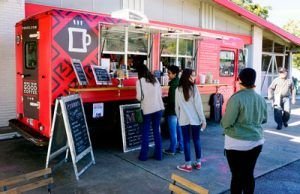
Critical Things to Know Before Starting a Food Truck Business
Food trucks or mobile food preparation vehicles (MFPV) have grown to become a staple in many major metropolitan areas. Starting one may seem like a great way to combine your love of cooking or food with business; however, there are many factors to consider when starting a food truck business, including adhering to all local, state and federal safety regulations, outlining your business plan and more.
How to start a food truck business
1. Planning for Success
Mobile food trucks are just like any other business – you need a plan in order to succeed. It’s best to start with a typical business plan template and ask and answer some very basic questions:
- What types of food will your food truck serve?
- Where will you food truck be parked, both when serving food and after hours?
- Who will work the food truck?
- Where will you prep the day’s food?
- Where and from whom will you get your needed ingredients?
 These questions in particular are very important to answer when you first conceive your food truck venture and should be carefully considered while fleshing out the rest of your business plan.
These questions in particular are very important to answer when you first conceive your food truck venture and should be carefully considered while fleshing out the rest of your business plan.
2. Acquiring a Food Truck
Food trucks are expensive. They also vary in size and functionality and that can greatly impact the type of food business you have. For example, you may choose to resell pre-packaged food, in which case you would not necessarily need a truck with grills, ovens or other kitchen supplies. Instead, you would more than likely need refrigeration units and display shelving or space.
When making your business plan and determining what type of food you will serve, you should be able to answer the question of the type of truck you’ll need. Many food trucks are now custom-built; however, it is possible to find a used one and modify to fit your needs.
3. Researching and Applying for Appropriate Licenses and Permits
This is perhaps the most important step in your food truck business. By applying for acquiring the proper licenses and permits, you will also meet the health standards that are now imposed for mobile food prep vehicles which is extremely important to not only the success of your business but avoiding any fines or penalties.
Some of the more common licenses you need include:
- Vehicle license and registration
- Business License
- Tax License
- Initial Food Inspector Certification
Many of these licenses will be issued at the state or city level, so it’s very important to conduct a thorough search to be sure all of your requirements are covered. Online resources like License123 and the SBA.gov Permits and License Database are a terrific place to start.
4. Location, Location, Location
Perhaps one of the biggest factors to your success will be the location of your food truck. Where will you park, at what times of day and what does the nearby competition look like? Remember that you must not only find some place legal to park (and more than likely be required to get a permit from the city to conduct business at that spot), but you’ll want to find an area with decent foot traffic (or ample parking if people are going to drive to you), a steady stream of potential customers at peak moments during the day and somewhere that the competition isn’t too bad.
Other things to consider when selecting a location:
Seasonality: It might be great to park near a high school or college, but what happens during the summer months when the population drops off? Have a contingency plan for what you’ll do when and if your traffic changes.
Demographics: If your specialty is a pizza you might not want to park in the middle of Chinatown. Similarly, if you’re serving macaroni and cheese with bacon and truffle oil, parking near a construction site might not be your best option. It’s best to not only find a spot based on traffic, but also on the types of people you’ll be serving. A work crew might enjoy cold beverages and salty snacks during the heat of summer or an office building might want fresh salads and health fair in the middle of the workday. Give some consideration to these differences in population when planning your food truck business and scouting a location.
5. Insuring your Mobile Food Business
Having insurance is a necessity and in many states, you won’t be able to file for a business license without it. In addition to liability insurance, you may also need workers insurance if you hire employees and property coverage to protect the contents of your truck if they’re lost, stolen or damaged. Also, you’ll need commercial auto insurance since your truck will be used for business and not personal use.
6. Complying with all Food Safety and Health Regulations
Like a restaurant, food trucks are held to a high standard when it comes to food safety and health. Food trucks are inspected, just like restaurants, and can be fined if the inspector finds any issues that could compromise the quality of the food being served to patrons. By acquiring the food and health licenses for your city and/or state, you’ll probably be well on your way to complying with regulations, but keep in mind standards for your business will be just as stringent as a brick-and-mortar restaurant.
7. Seasonality
Food trucks thrive in a variety of cities around the United States and the world, even those with harsher seasons. If you live somewhere that sees cold winters with snow and ice, spend time considering how you’ll overcome that challenge. Are there places you can go that offer more shelter or easier access than others so that customers will be less exposed to the elements? Does the food you serve make sense year-round (i.e. coffee seems to be a non-discriminatory beverage when it comes to temperature)? Spend some time thinking about how you’ll meet these challenges so that your food truck can have a long and prosperous career.
Starting a food truck business offers a lot of freedom and creativity to you, the business owner, but it is as nuanced as any other business type. Be sure to spend some time researching on the front end so that you can fill the bellies of your customers for years to come.
Leave a Reply
You must be logged in to post a comment.

Tambien puedes leer: